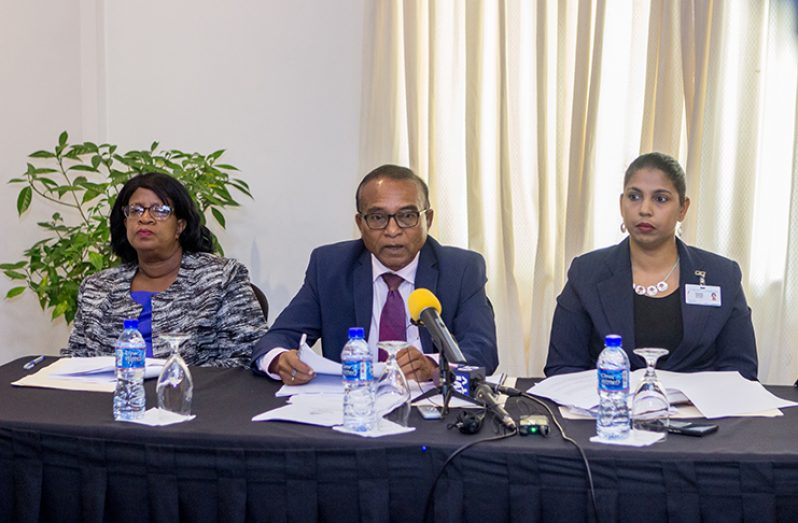…chairman vows to continue publicising names of defaulters
THE Integrity Commission said it is experiencing resistance from members of the judiciary as some are questioning the body’s right to conduct its work.
The work of the Integrity Commission is aimed at addressing corruption in public office and requires public officials to declare their incomes, assets and liabilities. It ensures that these public officers demonstrate the principles of accountability, dignity, diligence, duty, honour, integrity, loyalty, objectivity, responsibility and transparency.
On Wednesday (February 20, 2019), the commission held a press conference at the Herdmanston Lodge, where it stated that it will, nonetheless, continue with its publication of the names of defaulters in the press. Next up would be defaulters within the judiciary and the Ministry of Finance. “Some people, as far as I’m aware, they’re inclined not to submit. We have a situation where only 50 per cent of the people in the judiciary submitted and there are certain sections of the judiciary who are questioning whether or not this commission…,whether the provisions in it are not against their constitutional positions, because they’re secured by the constitution,” Chairman of the Commission, Kumar Doraisami, said.
“We’re now saying that we could prosecute you. My answer to whatever the queries are [is] I am in no position, or this commission is in no positon to use discretion as to whether or not we should publish their names. If they think they ought not to make their declarations to the commission, then they could put the challenge in the court.”
This chairman extended this option to anyone in the public who doubts the commission’s authority.
He added: “This commission has no discretion. We will have to publish those names if they don’t fill in their forms.”
The body recently interviewed a legal officer, who is also a compliance officer, whom they’re expecting to hire by March.
“We don’t have any investigative officers, so we’re trying to secure some; we’ll have to train them. Once we have the investigative officers we’ll be fully armed to go after those that are declarants who [are non-compliant],” he said.
“We have to ensure that they comply fully with the law; and if they don’t, then the next stage, as the law recommends, is prosecution.”
For the year, the commission has sent out forms and letters to declarants totalling 1,306, but has received only 590 thus far, with 716 defaulters still outstanding.
This led the commission to publish five different sets of names of defaulters in the official gazette and one daily newspaper.
Out of a total of 478 names published, 315 are still outstanding.
ENLARGED SCHEDULE
Meanwhile, the commission has reviewed its schedule of declarants and is now recommending that it be enlarged to accommodate new public offices.
These include the Special Organised Crime Unit (SOCU); the State Assets Recovery Agency (SARA); the Ministry of the Presidency Department of Energy (DoE) and head of the Financial Intelligence Unit.
The recommendation also encompasses the deputy commissioner of police; divisional commander and/ assistant commissioner; the crime chief; the traffic chief; the registrar, deputy and assistant registrar of the Land Registry; the deputy and assistant registrar of the Deeds Registry and the registrar, deputy and assistant registrar of the Commercial Registry.
“SOCU, SARA and so on, they weren’t present [at the passing of the Integrity Commissions Act of 1997]. So, as the society develops, we have to include certain people who are in it as public officers,” Doraisami explained.
“These are people in positions who can be susceptible somehow to people approaching them.”
The commission intends to relay these recommendations to the prime minister, who is responsible for the commission, after the present elections controversy is settled.
The prime minister can then decide whether to see the changes through to Cabinet and eventually the National Assembly.
The commission is also recommending that the date for submissions be shifted from July 1-June 30 to January 1-December 31, which is the normal fiscal year.
Meanwhile, it wants to see the last day to make declarations be shifted from June 30 to April 30 to coincide with the fiscal year for those who have to pay up their income tax.
It also highlighted the challenge of inefficient sums to conduct its work.
In the 2018 Budget, the commission spent $21M on current expenditure and $3.5M on capital expenditure, while for the 2019 budget, the commission received $45M for current expenditure and $2.5M for capital.
“This is not sufficient to run this organisation at full capacity. We need approximately $86M, so that we can cater for all the eventualities; for training programmes; public awareness programmes and so on. We also have to cater for the annual conference with the Caribbean-Commonwealth Integrity Commission,” he said, later adding:
“[So] we may have to apply for a supplementary budget in order to accommodate these other expenditures.”
In the meantime, the commission is organising its presidential report to send to the National Assembly as is required, within three months of the new year.
February 22, 2019 will mark one year since the commission was constituted.
Doraisami advised: “It’s in their [public officials’] interest to make these declarations. If they don’t make these declarations to the commission, the commission will not be in a position to secure their integrity. The public will have doubts…they’re curious and they may cast aspersions. In the case where you have your declarations in and they’re correctly put in and the truth are [is] in those declarations, then you don’t have to worry. A public officer is secured by this commission once the declarations are submitted.”



.jpg)









